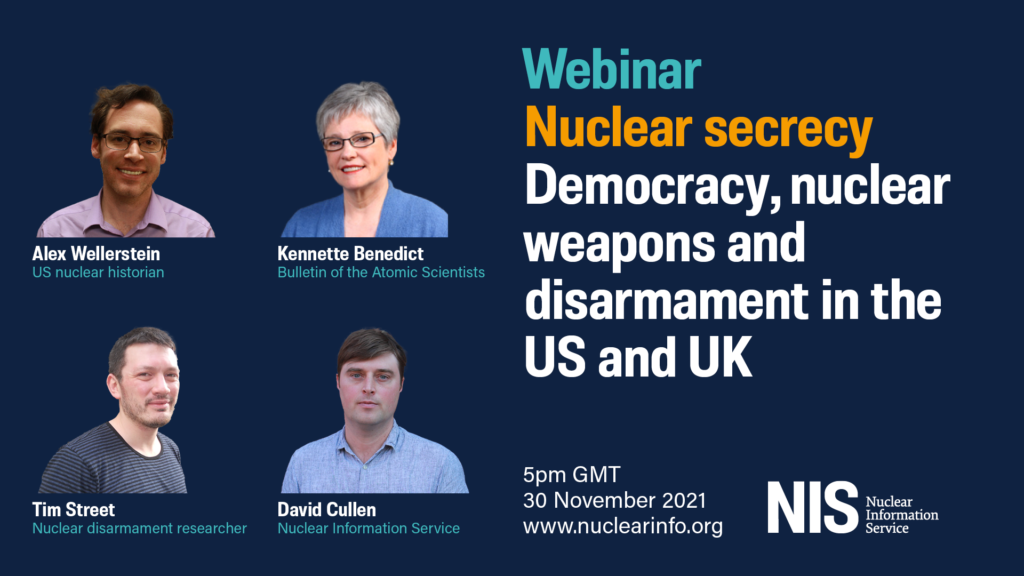30 November 17:00 GMT (London) 12:00 EST (New York)
Nuclear Secrecy – Democracy, nuclear weapons and disarmament in the US and UK
We are told that nuclear weapons exist to defend democracy. But nuclear decision-making has always been shrouded in secrecy and a lack of accountability. Decisions on nuclear use, which could end civilisation, are still taken by a very small number of overly powerful people. The UK and US along with the other nuclear weapon states are spending billions modernising their nuclear arsenals with little public awareness or debate.
This discussion with prominent British and American researchers and writers in the field is chaired by Tim Street and will cover the history of nuclear secrecy in the US and UK, how the bomb has affected the politics and society of nuclear weapon states, and what disarmament would entail. The discussion will be followed by a Q&A. If you wish to submit a question in advance please email office@nuclearinfo.org before 30 November.
REGISTER
SPEAKERS
Dr Kennette Benedict(@KennetteBene) is lecturer at the Harris School of Public Policy at the University of Chicago and senior advisor to the Bulletin of the Atomic Scientists. From 2005-2015, she served as executive director and publisher of the Bulletin, the leading scholarly magazine about threats to humanity from nuclear weapons, climate change, and disruptive technologies, known for its Doomsday Clock. From 1991-2005, Benedict was the director of International Peace and Security at the John D. and Catherine T. MacArthur Foundation. Previously she taught at the University of Illinois at Urbana-Champaign, and at Rutgers University, New Brunswick. She received her BA from Oberlin College and her PhD in political science from Stanford University.
Dr Alex Wellerstein (@wellerstein) is a historian of science who specializes in the history of nuclear weapons and nuclear secrecy. He is an Associate professor of Science and Technology Studies (STS) in the College of Arts and Letters at the Stevens Institute of Technology in Hoboken, New Jersey and teaches on “The Nuclear Age,” on the history of heredity, on a humanistic approach to the visualization of data, on “The End of the World,” and on science and media. He is also the Director of Science and Technology Studies at Stevens and his first book, Restricted Data: The History of Nuclear Secrecy in the United States was published by the University of Chicago Press in early 2021.
Dr Tim Street (@tmestreet) is a board member at Nuclear Information Service and campaigner with Drone Wars UK. He has been working on peace and disarmament issues since 2005. He has worked with Campaign Against Arms Trade, the International Campaign to Abolish Nuclear Weapons, British American Security Information Council, Oxford Research Group and Conscience. Tim completed his PhD exploring the politics of nuclear disarmament at Warwick University in 2017 and his first book The Politics of Nuclear Disarmament was published by Routledge in 2021. It was the subject of a NIS webinar in August this year with Professor Paul Rogers, Bradford University, Alicia Sanders-Zakre, ICAN and Henrietta Wilson, SOAS.
David Cullen (@Nuclearinfo) joined Nuclear Information Service in 2016 as Director, main researcher and spokesperson, he is the author of several reports including Trouble Ahead: Risks and rising costs in the UK nuclear weapons programme, 2019, and edited the 2021 briefing Nuclear Weapon Modernisation: Attitudes of non-nuclear states. He has a background in environmental, social justice and disarmament campaigning and previously worked for the International Coalition to Ban Uranium Weapons. He is currently a Trustee for the Conflict and Environment Observatory.
REGISTER
